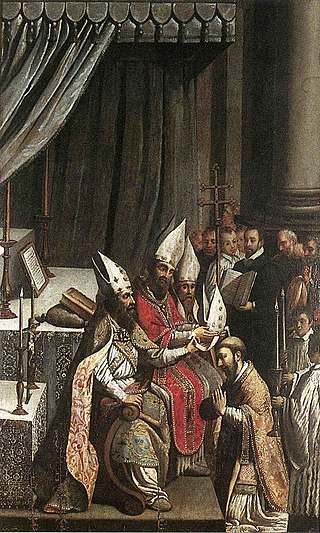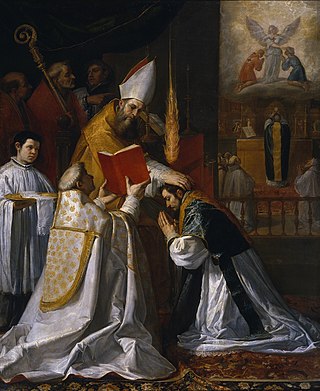Evangelist(s) may refer to:
Evangelist(s) may refer to:

Apostolic succession is the method whereby the ministry of the Christian Church is considered by some Christian denominations to be derived from the apostles by a continuous succession, which has usually been associated with a claim that the succession is through a series of bishops. Those of the Catholic, Eastern Orthodox, Oriental Orthodox, Church of the East, Scandinavian Lutheran, Anglican, Moravian, Hussite, and Old Catholic traditions maintain that a bishop's orders are neither regular nor valid without consecration through apostolic succession. These traditions do not always consider the episcopal consecrations of all of the other traditions as valid.
In the Latter Day Saint movement, an evangelist is an ordained office of the ministry. In some denominations of the movement, an evangelist is referred to as a patriarch. However, the latter term was deprecated by the Community of Christ after the church began ordaining women to the priesthood. Other denominations, such as The Church of Jesus Christ (Bickertonite), have an evangelist position independent of the original "patriarch" office instituted movement founder Joseph Smith.

In certain Christian denominations, holy orders are the ordained ministries of bishop, priest (presbyter), and deacon, and the sacrament or rite by which candidates are ordained to those orders. Churches recognizing these orders include the Catholic Church, the Eastern Orthodox, Oriental Orthodox, Anglican, Assyrian, Old Catholic, Independent Catholic and some Lutheran churches. Except for Lutherans and some Anglicans, these churches regard ordination as a sacrament.

Evangelism, or witnessing, is the act of sharing the Christian gospel, the message and teachings of Jesus Christ. It is typically done with the intention of converting others to Christianity. Evangelism can take several forms, such as personal conversations, preaching, media, and is especially associated with missionary work.
The Christian left is a range of Christian political and social movements that largely embrace social justice principles and uphold a social doctrine or social gospel based on their interpretation of the teachings of Christianity. Given the inherent diversity in international political thought, the term Christian left can have different meanings and applications in different countries. While there is much overlap, the Christian left is distinct from liberal Christianity, meaning not all Christian leftists are liberal Christians and vice versa.

Cru is an interdenominational Christian parachurch organization. It was founded in 1951 at the University of California, Los Angeles by Bill Bright and Vonette Zachary Bright. Since then, Cru has expanded its focus to include a broad range of audiences. In 2020, the organization had 19,000 staff members in 190 countries.

The Church of Jesus Christ is an international Christian religious denomination headquartered in Monongahela, Pennsylvania, United States. The church is a Christian Restorationist church and accepts the Book of Mormon as scripture. The church considers itself the gospel restored, or the original church and good news as established by Jesus Christ in the New Testament, restored upon the earth. It also claims to be the spiritual successor to the Church of Christ, organized by Joseph Smith on April 6, 1830. The church sees Sidney Rigdon as Smith's rightful successor following the assassination of Smith because Rigdon was Smith's first counselor in the First Presidency. The church is not officially affiliated with any other church, organization or denomination.
The Australian Fellowship of Evangelical Students (AFES) is an evangelical Christian student movement with affiliate groups on university campuses in Australia. It is a member of the International Fellowship of Evangelical Students.
Christians have used many different approaches to spread Christianity via the practice of evangelism. Christianity began with only a few different evangelistic approaches, but over the years, many different forms of evangelism have been employed by various groups to spread their faith. Many of these forms of evangelism are often employed in only certain parts of the world by Christians in different geographical areas. In particular, most new approaches to evangelism today have arisen out of Europe or the United States, especially when new technologies are used for the effort of evangelism.
In Christianity, an elder is a person who is valued for wisdom and holds a position of responsibility and authority in a Christian group. In some Christian traditions an elder is an ordained person who serves a local church or churches and who has been ordained to a ministry of word, sacrament and order, filling the preaching and pastoral offices. In other Christian traditions, an elder may be a lay person serving as an administrator in a local congregation, or be ordained and serving in preaching or pastoral roles. There is a distinction between ordained elders and lay elders. The two concepts may be conflated in everyday conversation. In non-Christian world cultures the term elder refers to age and experience, and the Christian sense of elder is partly related to this.

Women have played important roles in Christianity especially in marriage and in formal ministry positions within certain Christian denominations, and parachurch organizations. Although more males are born than females naturally, and in 2014, the global population included 300 million more males of reproductive age than females in 2016, it was estimated that 52–53 percent of the world's Christian population aged 20 years and over was female, with this figure falling to 51.6 percent in 2020. The Pew Research Center studied the effects of gender on religiosity throughout the world, finding that Christian women in 53 countries are generally more religious than Christian men, while Christians of both genders in African countries are equally likely to regularly attend services.

Roger Thomas Forster was a British Christian theologian who was the founder of Ichthus Christian Fellowship, a neocharismatic Evangelical Christian Church that forms part of the British New Church Movement.

The following outline is provided as an overview of and topical guide to Christianity:

Christianity is the largest religion practiced in Zimbabwe, accounted for more than 84% of the population. The arrival of Christianity dates back to the 16th century by Portuguese missionaries such as Fr. Gonsalo Da Silveira of the Roman Catholic Church. Christianity is embraced by the majority of the population. It is estimated 85 percent of Zimbabweans claim to be Christians, with approximately 62 percent regularly attending church services. Christian faith plays a very important role in the organization of Zimbabwean society.
Christianity is an Abrahamic monotheistic religion based on the life and teachings of Jesus as interpreted in the Bible. It is the largest religion in the world, with 2.4 billion people, known as Christians, that adhere to the religion.
The Open Brethren, sometimes called Christian Brethren, are a group of Evangelical Christian churches that arose in the late 1820s as part of the Assembly Movement within the Plymouth Brethren tradition. They originated in Ireland before spreading throughout the British Isles, and today they have an estimated 26,000 assemblies worldwide.